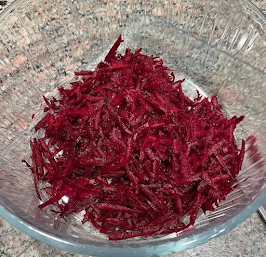Wondering about what foods to feed your dog or cat with liver disease? Pets with liver disease do best when they have a low-fat, moderate protein diet, but dogs and cats (especially pets with liver disease) can also benefit from a small, measured amount of beets. They support natural liver cleansing by increasing the oxygenation of the blood and by helping to break down toxic wastes. Beets contain glutathione, beta carotene, Vitamin C, iron and other vitamins and minerals, which can support liver function and help detoxify the body. Beets also contain betacyanin, a pigment that may help reduce inflammation and protect liver cells from damage. Organic beets (not beet pulp which is a controversial filler) are found in many premium raw and freeze-dried raw pet foods. You can also add a small amount of cooked or pureed beets to your pet's diet which provides a tasty and nutritious treat. However, since beets are high in fiber and sugar and can stimulate bile flow and cause staining of the fur, feed in strict moderation. A few shreds of raw beet go a long way.
Benefits of Beets For Liver Support In Dogs and Cats
Betaine: Betaine is a natural compound that supports liver function by aiding in detoxification processes. It has been linked to reduced inflammation and protection against oxidative stress.
Fiber: Beets are an excellent source of dietary fiber, promoting digestive health and regular bowel movements. Adequate fiber intake can help manage gastrointestinal issues commonly associated with liver problems.
Vitamins and Minerals: Beets contain vitamins such as vitamin C, B vitamins, and minerals like potassium and manganese, contributing to overall vitality and immune support.
Detoxification Support: The betaine content in beets has been associated with liver detoxification, helping to eliminate harmful substances from the body and reduce the burden on the liver.
Anti-Inflammatory Properties: Beets contain antioxidants that may help reduce inflammation in the liver, promoting a healthier environment for liver cells.
Digestive Health: The fiber in beets supports healthy digestion and can alleviate constipation or diarrhea, common issues in pets with liver problems.
Nutrient-Rich Addition: Beets provide a nutrient-dense option for pets, ensuring they receive essential vitamins and minerals necessary for overall well-being.
The grated beets in the above photo came from just one beet!
Cooked or Steamed: Serve beets cooked or steamed to make them more digestible for your pet. Avoid seasoning or adding any harmful ingredients.
Grated or Pureed: Grate or puree beets to mix with your pet's regular food. This can be especially helpful for pets who may be picky eaters.
Beet Treats: Consider making homemade beet treats, using
pet-friendly recipes that exclude harmful additives like salt and sugar.
How Much Beets To Give A Cat Or Dog?
Feed beets in strict moderation since they are high in sugar, can stimulate bile flow (e.g. more pooping) and cause staining of your pet's fur. A few shreds of raw beet go a long way. The amount and frequency should vary by the weight of the pet ranging from 1 shredded piece occasionally for a kitty to a half teaspoon daily for a 75+ lb dog with liver disease.
For more information on Liver Disease in dogs and cats click here.
Author: Susan Davis
Orignal post 6/15/20
Updated 3/13/24






